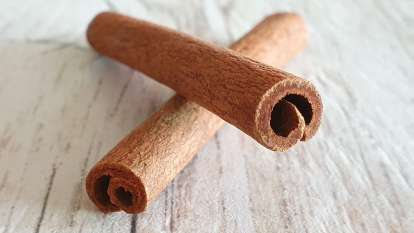Cinnamon
Cinnamon and its benefits
Most commonly used in desserts, cinnamon can also be used in appetizers or even main courses. Tips on beautifying and maintaining a healthy body may also include advice to use cinnamon with confidence. It has important antibacterial properties, which brings it to the forefront when it comes to good health.
What we may not have known until now is that cinnamon comes from the bark of a tropical Cinnamomun tree. It is scraped and then dried so it can be ready for consumption. During the drying process it takes the familiar stick shape. On store shelves you will find it in stick or powder form.
There are two types: Ceylon and Cassia. Both are healthy and bring multiple benefits, contrary to the opinion that only the former is the real one. The belief comes from the name - Cinnamomum verum. Most of Ceylon cinnamon comes from Sri Lanka, about 80-90%. Cassia originates predominantly in Indonesia. The rest comes from China and Vietnam.
Ceylon cinnamon has a sweet and delicate taste, the color of the velvety powder is light brown. Cassia is rough and gritty, dark brown in color; it intensely flavors dishes.
Storage is common and simple for this type of ingredient. The powder or rolls are stored in well-sealed, air- and heat-proof containers in a dark place. The rolls can be kept in this way for up to 3 years, while the powder will keep for about 6 months.
Nutritional values per 100 grams
Nutritional values
- Calories: 247 Kcal- Carbohydrates: 80.59 g
- Fiber: 53,1g
- Carbohydrates: 2.17g
- Fat: 1.24 g
- Saturated fatty acids: 0,345 g
- Cholesterol: 0 g
Minerals
- Ca: 1002 mg- Fe: 8.32 mg
- Mg: 60 mg
- P: 64 mg
- K: 431 mg
- Na: 10 mg
- Zn: 1.83 mg
Vitamins
- C: 3,8 mg- B1: 0.022 mg
- B2: 0.041 mg
- B3: 1.332 mg
- A: 295 IU
- E: 2.32 mg
Cinnamon benefits for the body
Using ingredients that are as natural as possible, without any additives, colorings or preservatives will bring multiple health benefits. The antibacterial, anti-inflammatory properties and the important antioxidant effect make the aromatic spice a valuable adjuvant in the preparation of remedies to support a healthy body.
Relieves symptoms in type II diabetes: regulates blood glucose and amplifies the effect of insulin. Use: cinnamon tea (½ teaspoon cinnamon to 250 ml water) - infusion, served in the morning on an empty stomach.
Antimicrobial properties: cinnamon essential oil, truly pure, can be used in a diffuser to freshen the room. Inhaled, it will bring its benefits. Flu and cold symptoms, common in the cold season, are relieved thanks to the antimicrobial effect of the flavored powder. Use: cinnamon tea or a few drops of essential oil diffused 2-3 times a day.
Treatment for Candida: Ceylon-type cinnamon is well-suited in the fight against various types of Candida. Due to its low level of coumarin 0.02% ( Cassia-0.04-0.08%) it is unlikely to cause toxicity, affect the liver. Studies show a very clear logical process. Candida thrives in environments, where sugar levels are high. Cinnamon is renowned for its ability to keep blood sugar levels under control, making it useful in treating the condition. Use: 2-3 drops of essential oil added to your favorite beverage (coffee or hot chocolate are excluded); boil a cinnamon roll in about 250 ml water - the resulting drink can be flavored with a teaspoon of freshly squeezed lime/lemon juice.
It could help treat HIV: Laboratory studies have shown it may be useful in treating HIV-1, a virus that causes the immune system to break down. But the results need to be certified by tests on people suffering from AIDS.
Helps with conditions such as Alzheimer's and Parkinson's: compounds found in cinnamon help protect neurons and improve the way connections are made in the brain.
Reduces the risk of cardiovascular disease: Along with exercise and a balanced diet, it can help reduce total cholesterol, LDL cholesterol and triglyceride levels.
Calms migraines: The anti-inflammatory effect coupled with the power to release tension in the brain recommends cinnamon as an adjunct in treating severe headaches.
It has antioxidant benefits: Rich in polyphenols, cinnamon beats superfoods like garlic and oregano. Antioxidants are indispensable to life and have an important anti-inflammatory effect.
Maintain pleasant breath: Thanks to its antimicrobial effect, it helps prevent tooth decay and contributes to pleasant-smelling breath.
Natural insect repellent: Destroys mosquito larvae in particular.
Beautifies hair and skin: Strengthens hair and restores elasticity. Helps exfoliate and eliminate problems caused by unwanted dandruff. Acne-prone skin will return to normal if you use a mask with cinnamon in its ingredients.
Contraindications and side effects
The most important contraindication concerns people who already have liver disease. The high coumarin content can aggravate the condition, the benefits turning into inconvenience. Of course, even healthy people should consume in moderation so as not to affect the body's liver function.
Oral thrush has been associated with cinnamon taken without moderation.
As with any complementary drug treatment, caution should be exercised. When taken with medication intended to treat diabetes, cardiovascular disease or liver disease, it may amplify the beneficial effects or intensify the adverse effects. Neither situation is desirable.


Comments